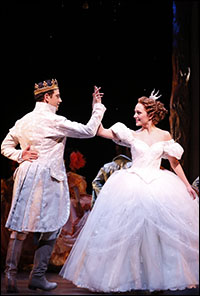
*
Director Mark Brokaw's latest Broadway assignment presents a unique opportunity. He's been given the opportunity to stage a Richard Rodgers and Oscar Hammerstein II musical that has never before graced the Great White Way. Cinderella premiered as a 1957 television film starring Julie Andrews in the title role. Since then, it's been remade for television twice. It's also been given a number of live presentations, regionally, since the 1960s, with amendments to the TV script and score. The property's closest brush with Broadway was a national tour that played The Theatre at Madison Square Garden, in 2001; it was also produced by New York City Opera in 2005.
For this new Broadway production, the show has been updated for contemporary audiences with a new book by Douglas Carter Beane (Sister Act, Xanadu, Lysistrata Jones, The Little Dog Laughed, As Bees in Honey Drown). Additionally, four Rodgers and Hammerstein songs have been interpolated into the original score. We got a few minutes with Brokaw, known for directing Broadway's The Lyons, Cry-Baby, Reckless, The Constant Wife and After Miss Julie, and Off-Broadway's Lobby Hero, This Is Our Youth, How I Learned to Drive, The Dying Gaul and more.
How did you get attached to this project?
Mark Brokaw: I got attached after Doug Beane. I think they approached Doug and then they approached me.
At that time, did you have a history with Cinderella? Was it a show that you knew? Had you seen the original television broadcast?
MB: When I was in grade school, I saw the [1965] Lesley Ann Warren version. The only thing I remembered about it was, it was always exciting to watch because it started with a curtain opening. A curtain would open and, at the end, a curtain would close. I felt I was watching a Broadway musical. When you became involved in this production, was the concept for the staging already in place?
MB: You know, I think Doug had a very clear idea about how he wanted to approach the story. Some songs that are included in his version were already a part of his book. When I read the book, his point of view was so clear. I have to say, when they first called me about Cinderella, my first instinct was, "Hm." But as soon as I read his book I was immediately hooked.
Can you talk more about Beane's perspective? If I read the script, would I immediately recognize it as a Douglas Carter Beane piece of work?
MB: Oh, gosh! I think it has his trademark wit. It has his trademark intelligence. But I think it's different, because I don't think he's ever tackled material exactly like this before. I think he has very smartly reinvented the fairy tale — and, at the same time, with absolute respect for the story. I think he upends our expectations for the story, and keeps us on our toes. And he upends our expectations for the characters, as well.
 |
||
| Santino Fontana and Laura Osnes in Cinderella. |
||
| Photo by Carol Rosegg |
MB: I think the heart of the story is timeless. That's why we still like fairy tales. There's something at the heart of the human condition there, and I think that's certainly true of Cinderella. In this script, the Fairy God Mother says to Cinderella at one point, "You're the only one who has shown me charity, generosity and kindness." I think those are timeless things, and it's always important to be reminded of them.
What Rodgers and Hammerstein songs were interpolated into the score?
MB: Uh, it's hard for me to remember because they all seem like they've been there all the time. There is a song called "Loved and Learned," a song called "Now Is the Time," and one called "Me, Who Am I?" and "The Music in You."
You've directed Broadway musicals before. But is there a difference between directing a new musical and directing a piece by Rodgers and Hammerstein? Do you have to use different tools?
MB: No, I don't. I don't think so. It's just that Rodgers and Hammerstein are the gold standard. So much of what musical theatre is today still comes from what they did. They put in social content. And I think that's still what's in musicals today. That's what's in Spring Awakening.
From a certain point of view, you're in the curious position of directing a Rodgers and Hammerstein Broadway premiere.
MB: Yeah. One of the fun things about working on it is: It really does feel like we're working on a new show, a brand new Rodgers and Hammerstein show. That's exciting and not an everyday occurrence.
And all the numbers have been newly orchestrated.
MB: Yes. We're really lucky to have David Chase on board as our musical supervisor. One of his tasks was to really arrange the score. He's a Rodgers and Hammerstein nut. Their music is in his blood. He had to make the score totally fresh and today, and totally Rodgers and Hammerstein.



























































